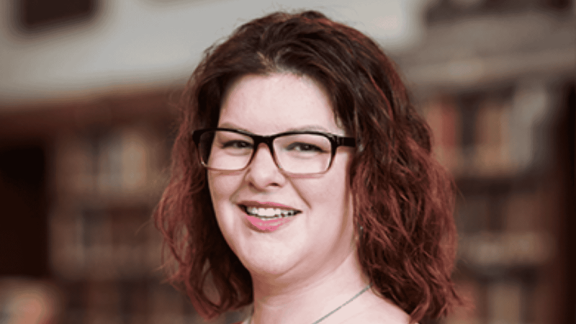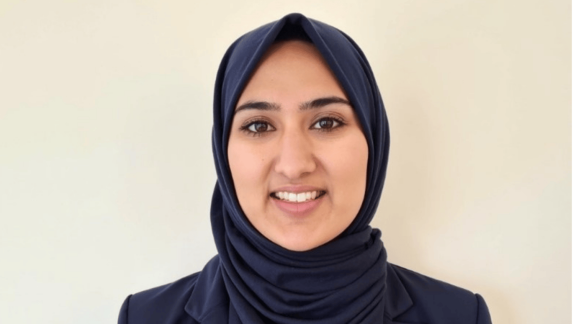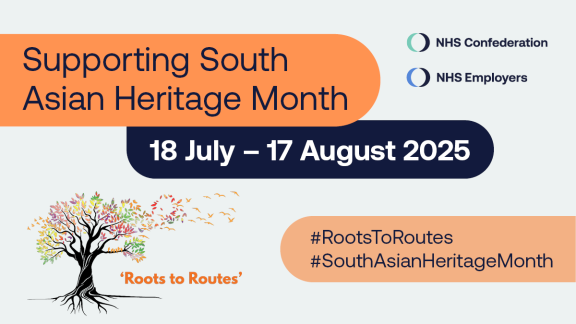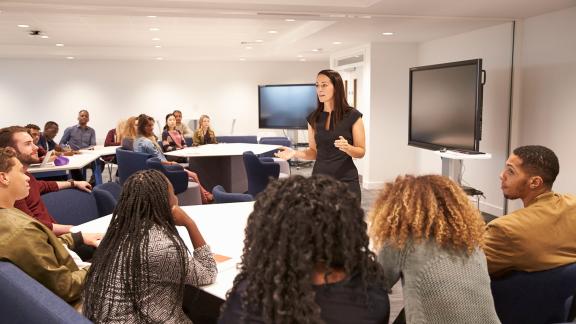Inclusive care begins with diverse chaplaincy

Clare Elcombe Webber is chair of the Network for Pastoral, Spiritual, and Religious Care in Health (NPSRCH) and also director of Humanist Care for Humanists UK. On World Day for Cultural Diversity, Clare talks about something close to her heart, the importance of diverse chaplaincy, which is vital for creating a fairer, more inclusive NHS we all strive for.
I'm chair of the NPSRCH, a group of representatives from different faith and belief communities, including humanists like myself, Christians of different traditions, Sikhs, Jews, Hindus, Muslims, Buddhists, Pagans, Jains, Baháʼís and more. We champion high-quality, person-centred pastoral, spiritual, and religious care, and work to ensure that patients, families, and staff access the support that’s right for them.
“Diversity within our chaplaincy provision isn't just nice to have - it’s a necessity for providing truly inclusive care.”
Reflecting the communities we serve
The UK today is a wonderful tapestry of cultures, backgrounds, faiths, and beliefs.
The 2021 Census revealed that for the first time, fewer than half (46.2 per cent) described themselves as Christian (down from 59 per cent in 2011). ‘No religion’ was the second most common response, rising sharply to over a third of the population (37.2 per cent up from 25.2 per cent in 2011). We also saw growth in communities identifying as Muslim (now 6.5 per cent) and Hindu (1.7 per cent), alongside many others including Sikh, Jewish, Buddhist, Pagan, and Jain.
The way people engage with faith and belief is becoming more varied, moving towards less formal practice and more individualised approaches to spirituality. Many people no longer fit neatly into traditional boxes; they might describe themselves as 'atheist but spiritual', draw wisdom from multiple traditions, or blend different cultural and faith backgrounds into their personal identity. This means understanding someone's pastoral needs requires looking beyond simple labels. Some individuals may not automatically accept the traditions they were brought up with, and may be more actively seeking out practices and rituals that align with their worldview.
When these people interact with the NHS, often at times of great vulnerability or stress, they bring an equally diverse and personal range of pastoral, spiritual, and religious needs. Someone might need specific religious rites, another might seek comfort in shared cultural understanding, another a compassionate listening ear from someone who understands their non-religious worldview.
Many chaplaincy teams are doing incredible work meeting these fluid changing needs, and are blazing the trail for diverse, inclusive services which are fit for modern communities.
Diverse chaplaincy services are the answer
A team that includes people from different faith traditions, belief systems (including non-religious perspectives), cultural backgrounds, and life experiences offers a broader range of insights, skills, and approaches. This diversity fosters a richer understanding within the team, encourages innovation, and ultimately leads to more holistic, person-centred care. A service which looks diverse and inclusive will be perceived as this, we know from research that most traditional chaplaincy services are perceived as Christian, and even though this isn’t true, it is a real barrier to non-Christians accessing support. The updated NHS Chaplaincy Guidelines, reinforce this:
“Chaplaincy services must be available equally to all, regardless of religion or belief, and without discrimination.”
The guidelines specifically advise managers to give "due regard to the religions and beliefs represented in the patient population" when shaping their chaplaincy services.
This doesn't mean we need a service where a patient can only be seen by a chaplain of the same background. Whilst belief-specific care is vital when requested, connection often happens through shared humanity. A diverse team offers more possibilities for that connection to happen. Diverse teams also allow for more inclusive and creative broader chaplaincy work, whether that is the provision of memorial services, celebrations, reflective practice and debriefs with staff, or in building bridges with local community belief groups.
Building inclusive services
Equality, Diversity and Human Rights Week is a time to reflect on your own local chaplaincy services.
- How diverse is your team?
- Do your recruitment processes actively welcome and encourage applications from the widest possible range of faith and belief backgrounds?
- Are you considering taking action to help foster diversity?
At the NPSRCH, we're here to support this work. We collaborate with faith and belief communities and healthcare providers to share best practices and promote excellence in inclusive care. One of our activities is to monitor NHS trust recruitment and we want to support trusts in only restricting posts to particular religions or beliefs where there is a genuine occupational requirement to do so. We strongly recommend that you make use of the UK Board of Healthcare Chaplaincy (UKBHC) appointment advisors and their model person specifications to help you build an effective, inclusive chaplaincy team.
Looking ahead together
Our communities are diverse, and their needs are varied and deeply personal. Our chaplaincy teams must reflect this to offer the best possible support.
Let's continue working together – NHS leaders, chaplaincy services, and organisations like the NPSRCH – to build and nurture chaplaincy teams that truly represent the public we serve. By doing so, we can ensure that everyone has access to the pastoral, spiritual, or religious care that resonates with them, whenever they might need it.



